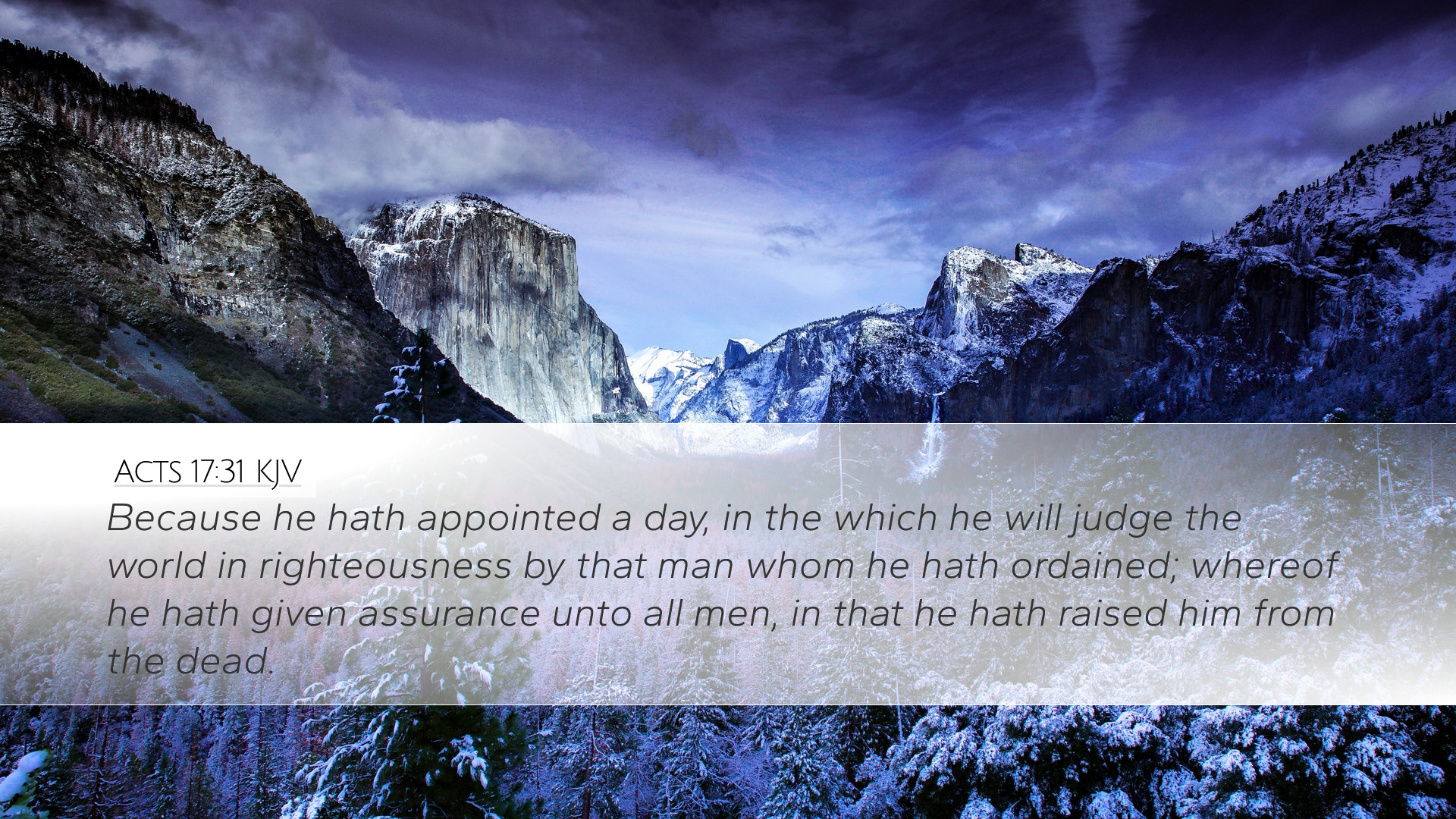Commentary on Acts 17:31
Verse: "Because He hath appointed a day, in the which He will judge the world in righteousness by that Man whom He hath ordained; whereof He hath given assurance unto all men, in that He hath raised Him from the dead." (Acts 17:31, KJV)
Introduction
Acts 17:31 is a pivotal scripture reflecting the Apostle Paul’s proclamation of God's sovereignty and the certainty of divine judgment. Paul, speaking to the Athenians on Mars Hill, articulates a crucial aspect of Christian doctrine—the assurance of a coming judgment by Jesus Christ, affirmed by His resurrection. This commentary synthesizes insights from respected public domain commentaries, delving into the theological implications and practical applications for today’s readers.
The Divine Appointment of Judgment
Matthew Henry emphasizes that God has “appointed a day” for judgment, indicating a predetermined time in history when all humanity will be called to account for their lives. This notion of divine appointment reflects God's sovereignty and the certainty of His plans in human history.
- Sovereignty of God: The appointment implies that God is not only aware of human actions but has ascribed a specific day for judgment, underlining His control over time and events.
- Certainty of Judgment: There is a stark reminder of the reality of judgment, which serves to awaken a sense of moral responsibility among individuals.
Judgment in Righteousness
Both Albert Barnes and Adam Clarke assert that the judgment will be executed “in righteousness.” This points to the perfect moral nature of God, ensuring that justice will prevail in the judgment process. This righteousness signifies several important aspects:
- Impartiality: God’s judgment is impartial, which calls for believers and non-believers alike to stand before Him without favoritism.
- Standard of Justice: The righteousness of God indicates that the standard by which judgment is executed will be absolutely just, devoid of corruption and bias.
- Accountability: The reality of a righteous judgment acts as a deterrent against unrighteous living, urging individuals to pursue holiness.
The Role of Jesus Christ
Paul refers to “that Man whom He hath ordained,” identifying Jesus as the appointed judge. This serves to solidify the unity of Christ’s dual roles as Savior and Judge.
- Christ’s Authority: As ordained by God, Jesus has the authority to execute judgment, reinforcing His divinity and the importance of His sacrificial role.
- Connection to Salvation: The message is clear—embracing Jesus as Savior is integral to standing justified before Him in the day of judgment.
- Humanity of Christ: Referring to Him as “that Man” emphasizes His identification with humanity, providing a relatable and sympathetic judge.
Assurance Through the Resurrection
Paul’s declaration that “He hath given assurance unto all men, in that He hath raised Him from the dead” offers profound implications for belief and hope. Matthew Henry notes that the resurrection is not only a cornerstone of Christian doctrine but also serves as a validation of God’s promises.
- Foundation of Faith: The resurrection assures believers of the reliability of God's word and the promise of eternal life.
- Universal Assurance: The phrase “unto all men” signifies that this assurance is extended universally, calling all people to respond to the gospel message.
- Encouragement for Evangelism: Knowing that there is an assurance given boosts the imperative for believers to evangelize and share the hope found in Christ.
Theological Implications
This verse encapsulates vital theological themes central to Christian belief:
- The Doctrine of Judgment: It affirms the belief in an impending divine judgment, shaping Christian eschatological views.
- The Nature of God: Displays God’s holiness, justice, love, and mercy, seen in His willingness to provide a means of salvation through Christ.
- Importance of the Resurrection: Emphasizes the centrality of the resurrection, an event foundational to Christian faith that assures believers of victory over sin and death.
Practical Applications
The insights gained from Acts 17:31 resonate deeply with contemporary believers:
- Call to Holiness: Understanding the certainty of judgment should lead believers to live righteously, holding themselves accountable before God.
- Hope in Christ: The reassurance provided by the resurrection fosters hope and comfort in times of trial, affirming God’s ultimate victory.
- Urgency in Evangelism: The imperative to share the message of Christ becomes pronounced; it acknowledges the reality of judgment and the necessity of salvation.
Conclusion
Acts 17:31 stands as a powerful reminder of God’s sovereignty, the righteousness of His judgment, the authority of Jesus Christ, and the assurance provided through the resurrection. For pastors, students, theologians, and Bible scholars, it encapsulates essential truths that shape Christian doctrine and discipleship. The weight of this verse not only challenges but empowers believers to live faithfully, anticipate Christ’s return, and proclaim the gospel.


